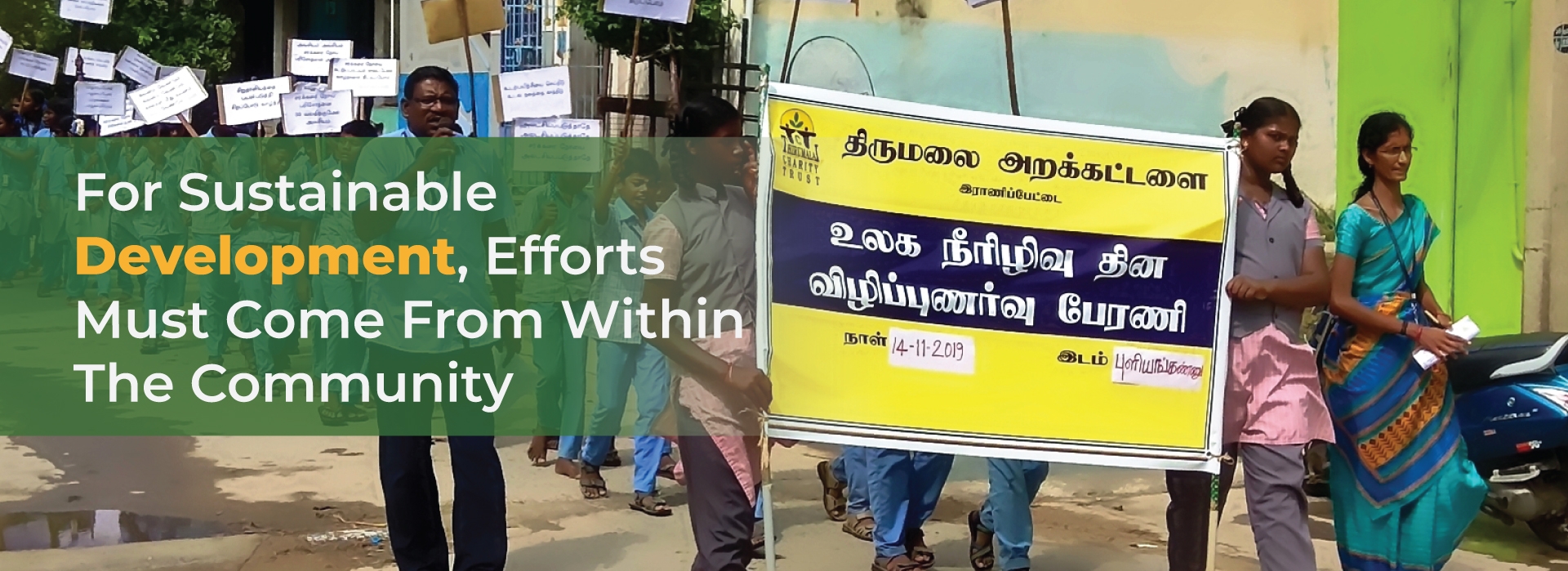
Our project area covers 315 villages, 50 panchayats, covering a population of 160,00 in 35,000 families in Walaja and Katpadi Taluk of Vellore District of Tamilnadu. In 2019, after the Vellore District was trifurcated, the change effected was 201 villages, 34 panchayats in Vellore District and 114 villages and 21 panchayats in Ranipet District.
Annam,our Community-Based Organizations (CBOs) and Family Care Volunteers (FCVs)
TCT’s Core belief is that development efforts must come from within the community. To translate this belief into practice, TCT utilizes community-based women volunteers and action groups. This practice has reaped a rich dividend for the community over the years. point for our action with volunteers. After a series of discussions with the community and staff, we created a unique integrated nodal community-based organization called Annam. In every village, the composition of Annam is an average of 15 members drawn from TCT trained Volunteers, Health Committee Members, Disability Self Help Group and Federation Members,
in addition to a few interested beneficiaries of TCT programmes. This group works closely with the panchayats and Government representatives visiting the villages from various departments for their needs. Family Care Women Volunteers selected by the community actively coordinate the activities of Annam and provide local support in implementing the programmes in many villages. To facilitate their participation and involvement, we attend these meetings and provide education and training.
In villages with more than 100 families, we organize these Annam Community-Based Organizations. In other villages which have a lesser number of families, the Family Care Volunteers (one each for 50 families) provide services supported by village elders and beneficiaries. Starting with 96 FCVs in 2009, the number grew to 470; the Annam groups were 90 in number in 2013 and this has grown to 138 by 2020.
The FCVS attend monthly training and education programmes as a group at the cluster level. They provide support in the villages.
Both FCVs and CBOs are educated on many topics such as ANC care, reproductive health, anaemia, nutrition, diabetes, obesity, hypertension, osteoporosis, arthritis, violence against women, mental illness, disability, HIV/AIDS, women & cancer, TB care & control, tobacco abuse, alcoholism.
The CBOs help in many ways, most importantly, they enable participation and ownership of our programmes. They update us on census data in the villages, identify those requiring care and support and provide referrals and help in conducting village programmes. They also participate in the Grama Sabha meetings and engage with the Government for some of their local issues.
Similarly, in a more proactive manner as individual volunteers, the FCVs engage with us. They conduct the CBO meetings, provide alerts for key issues, assist our staff in their village-level work, participate in mass campaigns and participate in training meetings. They communicate about TCT’s camp and other programmes, help identify who needs them, refer them and often even accompany the patients to the hospital and camps, and also provide a valuable service in educating and ensuring the required follow-up for them.
Our Multi-Purpose Assistants (MPAs) are assigned to about 1000 families for their care in specified villages. They are managed by a Project Officer/ Project Executive for 5000 families designated as an area. There are seven areas and all the programmes in the project area are managed by a General Manager. There are also some senior experienced staff who assist him as programme coordinators at the project level. The team works closely with the hospital team to serve the villages.
During village visits, promotion, education, detection and screening, referral, treatment and follow-up activities are organized for different target groups.
To provide a special line of care to the community patients, each medical department of the Thirumalai Mission Hospital conducts camps. As the field staff identify people with a need, they are referred to these camps. After they attend the camp, the field staff provide follow-up care for them at home as needed and ensure their treatment cycle is completed as needed.
This integrated model of care utilizing the primary healthcare network in the community and medical expertise at the hospital is practised for the benefit of the community in all the programmes of TCT. Our past experience has enabled us to organize the activities with a better focus to track the individual’s health and the progress of the activity. This has resulted in shaping the following programmes.
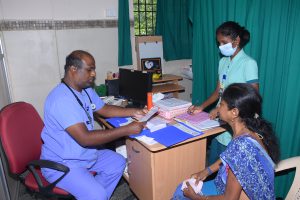
Non-communicable Diseases (diabetes, cardiovascular diseases, hypertension, stroke, osteoarthritis, ageing related impairments, bronchial asthma, oral, breast and uterine cancer, etc) and secondary/tertiary health care needs of women and children far surpass communicable diseases as the leading cause of death, lost productivity and out of pocket expenses.
Since 2012, we have been engaged in combating non-communicable diseases in the community. There is a well thought out comprehensive programme of screening, identification, referral, treatment and follow-up besides education for primary and secondary prevention in patients with NCDs. The MPAs are given a basic medical kit to take with her on home visits. The kit contains a blood pressure and glucometer, weighing machine, and inch tape. These kits enable them to identify people who suffer from diabetes, hypertension, and obesity.
This is the flagship programme of our hospital for the community.
TCT will embed the hospital within the community and incrementally reach out to all the villages in the project area to identify and treat NCDs. It will progressively enroll most of the families in the project area for TCT’s services. It will collaborate with the Government and other private organizations to fill in the gaps in its expertise, ensure cost effectiveness and maximum benefit to the community. It will also use these relationships to disseminate the results of the project.
Diabetes, hypertension, osteoporosis, obesity, screening for cervical and breast cancer in women and screening for oral cancer have received our attention and we have served a significant number of people in this programme.
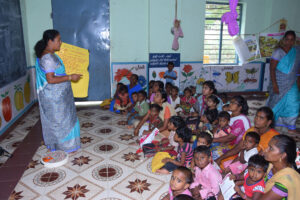
Women and children’s wellness has always been at the centre of TCTs community health activities.
Maternal and Child Health
Our Multi-purpose assistants identify ante-natal mothers during home visits, with the help of village health nurses, volunteers, beneficiaries and Annam members. The ante-natal mothers are educated on nutrition, immunization, the need for calcium and iron supplements, the importance of institutional delivery and family planning. Our Health Workers in their monthly village visits measure their weight and blood pressure. They also see the record of sugar, albumin and haemoglobin levels and apprise the mothers of any risks they have and advise them suitably. The mothers are visited within seven days of birth to see if there are difficulties in breast feeding and are counselled on diet and nutrition. Within the first two months, babies are also assessed on weight at birth and health status. They are examined from head to foot to detect any problems. Their immunization status on BCG, 1st dose of pentavalent and polio is ascertained.
Paediatric Health
Children under 5 years are monitored for growth and their immunization data obtained. Mothers are educated on nutrition, immunization, personal hygiene, breast feeding and care during minor ailments. Children are tracked on the developmental milestones. Early detection of disability is a focus area and those identified are referred for detailed assessment and special care and interventions.
Towards Wellness
To focus on women’s wellness, from pregnancy till the time their children turn five, the following aspects are emphasized: healthy diet practices, regular physical activity and the need to maintain correct weight for height. Appropriate contraception methods are advised. Women who have had gestational diabetes, hypertension and low haemoglobin during their pregnancy form a priority group for education. Overweight and obese women are also offered suitable advice and intervention to achieve correct weight for their height.
Women with gynaecological problems are identified and referred to the hospital for timely care.
Women detected with possible risks of cancer in our women cancer screening programmes are also monitored periodically as designated by the gynaecologist.
Women who are affected by the alcoholism of their husbands are given guidelines on how to cope with the problem. In parallel, our rehab team reaches out to the alcoholics to seek treatment at our centre. Domestic violence often surfaces as an issue and we work with other women in the community to offer protection to the abused women in such instances. A challenging task given the women’s social conditioning to accept abuse as a given thing, nevertheless worth the effort even if it makes a small dent in the community towards women’s wellness.
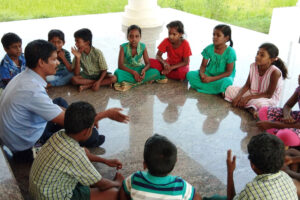
TCT has been helping families affected by alcoholism with comprehensive de- addiction and rehabilitation programmes since 1992 in community-based camps. Since 2014, this is dealt with at the N. R. Swamy Rehab and Wellness Centre. The community team educates, identifies and refers alcoholics to the centre for treatment to help them recover (Meetpu) through the comprehensive treatment provided there.
In the younger age group, addiction to alcohol and other substances is a growing problem and addiction to digital devices and gaming is also a new trend. There are also multiple behavioural issues seen in this group. TCT offers a series of educational sessions (Kaappu) for adolescents in schools to empower them to adopt good and healthy behaviour and overcome peer pressure that inducts them into unsafe behaviour and alcohol and substance abuse. These sessions also help to identify adolescents with problems who are then referred to our centre for counselling.
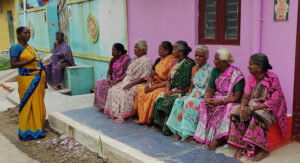
Senior citizens are offered education on osteoporosis, care of eye, good nutrition, diabetes and hypertension. In these programmes, we check their sugar and blood pressure levels and provide suitable advice on diet, exercise, medicines and stress-free living. We give free screening with a dexa scan for osteoporosis and consultation at the hospital. Those detected with problems are provided subsidised medicines and followed up in their homes for replenishing their medicine stock on a monthly basis. They are also screened for cataract problems and referred to eye camps at the hospital. Cataract surgeries are done at the referred hospitals completely free of charge. Their family members are included in counselling programs if necessary. They are referred to the Hospital for their ailments.
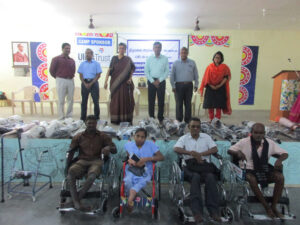
A project for screening for hearing impairment and assessment among infants and children below 5 years is already in place. Those identified with speech and hearing impairment are assessed in detail at the hospital and are offered speech therapy at our community centres.
Children identified with other kinds of disability in the Janani programme are assessed in detail by the paediatrician and are offered suitable interventions and referrals based on needs. All these children are followed up to ensure they go through the offered solutions.
One in 6 months, the needs of the differently abled are assessed for their requirements of assistive devices, mobility aids and appliances. Through networking with other NGOs, their requirements are met within a short period of time. Artificial limbs, wheel chairs, calipers and other assistive devices are distributed each year.
The government assistance schemes are facilitated by the field staff at specific times during the year. This activity is coordinated at the organisation level.
Following awareness activities in the villages, mentally ill are identified. Through a process of sensitising the care givers in the families to accept the condition and enabling treatment at TMH and through telemedicine with consultants from specialised institutions, the mentally ill are offered treatment. A further step is also taken to help them access medicines from government hospitals.
Besides education for the defined target groups, attention is given to certain topics to educate the community. Violence, Suicide, Obesity, Women’s Health and Issues, Diet, Life Style Modification, Diabetes, Hypertension, Osteoporosis, Cancer, Alcoholism, Disability and TCT’s programmes and hospital services are the various topics covered.
We organize a number of rallies in the community to highlight issues of cancer, mental illness, disability, tobacco abuse and alcoholism. Five-day campaigns are organized for diabetes awareness and yathras to create awareness about alcoholism. Posters, hand-outs, cultural programmes, exhibitions, screening, identification of patients, rallies, human chains form part of these programmes.
World Women’s Day, Osteoporosis Day, Diabetes Day, Disabled Day, Cancer Day, Mothers’ Day, Breast Feeding Week, Nutrition Week, AIDS day are observed. Beneficiaries’ meetings are held once a year. Community Pongal and valaikappu for antenatal mothers are also annual programmes.
